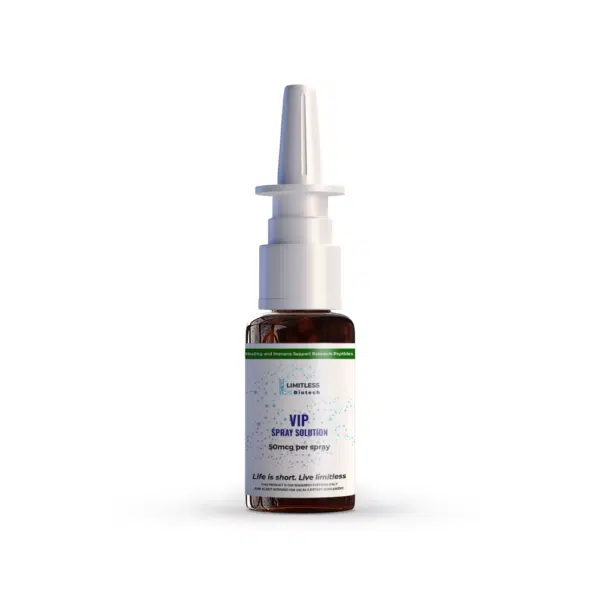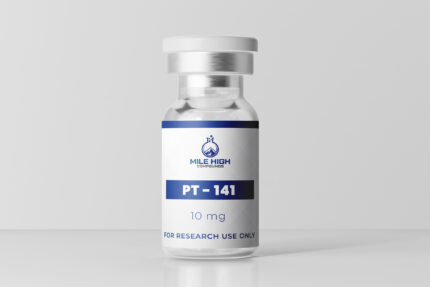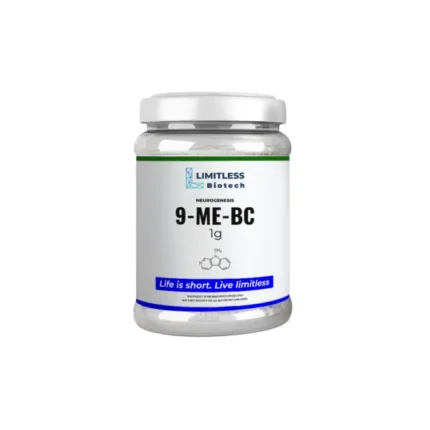Vasoactive Intestinal Peptide and Gastrointestinal Function
Vasoactive Intestinal Peptide (VIP) is a 28-residue amino acid peptide first characterized in 1970. It’s a member of the secretin/glucagon hormone superfamily and has a wide range of physiological and pathological effects on the gastrointestinal (GI) system.
VIP mediates a number of GI functions such as regulating gastric acid secretion, intestinal anion secretion, enzyme release from the pancreas, cellular motility, vasodilation, and intestinal contractility. A 2019 study showed that VIP can influence nutrient absorption, gut motility, glycemic control, carcinogenesis, immune responses, and circadian rhythms [R].
VIP also plays a crucial role in the development and maintenance of colonic epithelial barrier integrity under physiological conditions and promotes epithelial repair and homeostasis during colitis, as shown in a 2024 study [R].
Interestingly, VIP deficiency has been associated with altered gut microbiota communities, as shown in a 2019 study. VIP knockout mice were more susceptible to chemically-induced intestinal inflammation, suggesting that VIP is crucial for gastrointestinal tract health [R].
VIP also has a role in the control of smooth muscle tone and motility, blood flow, and secretion in the digestive tract. A study in 2023 showed that small intestinal motility is regulated by the microbiome through modulation of VIP [R].
VIP and Neurobiology and Brain Function
In the realm of neurobiology, VIP is expressed in various brain regions associated with learning, memory, and affective functions, such as the hippocampus, cortex, and amygdala. A 2008 study demonstrated that mice deficient in VIP exhibited select cognitive deficits, suggesting that VIP plays a critical role in cognitive processes. Furthermore, VIP plasma levels have been associated with affective symptoms and brain structure and function in healthy females, indicating a potential role for VIP in the neurobiology of affective disorders [R, R].
VIP’s therapeutic potential has been explored in neurological disorders. It acts via three different G protein-coupled receptors (GPCRs): VPAC1, VPAC2, and PAC1, which are identified in various tissues, including the brain. These receptors are involved in signaling pathways that may be relevant to neurological pathologies, and thus, VIP and its receptors could be potential targets for novel treatments [R].
Research has also suggested that VIP can ameliorate blood-brain barrier function, which could contribute to reducing brain damage. In the context of migraine, a 2021 study found that VIP infusion provoked migraine attacks in a significant number of patients, indicating that VIP or the dilation of cranial arteries might play a role in migraine pathophysiology [R, R].
VIP’s neuroprotective and neurotrophic properties have been highlighted in the context of cognitive decline and neurodegenerative diseases. For instance, VIP administration has been shown to help preserve cognitive function in various models of neurodegeneration. Moreover, VIP-expressing interneurons (VIP-INs) have been implicated in neurodevelopmental disorders, with evidence suggesting that VIP-IN dysfunction may occur in models of genetically determined neurological disorders [R, R].
In a mouse model of Dravet Syndrome, a severe neurodevelopmental disorder, VIP-INs were found to be impaired, which could contribute to the disease’s epileptic phenotype. Additionally, VIP has been shown to modulate hippocampal synaptic plasticity, which is relevant to cognitive decline and mesial temporal lobe epilepsy [R, R].
VIP and Immunomodulation and Inflammation
VIP has been shown to have a dramatic effect on immune cell activation and function. For instance, it has been found to ameliorate clinical signs of disease and histopathological lesions in animal models of human Crohn’s disease. A 2020 study also found that the VIP system was dysfunctional in patients with Graves’ disease, an autoimmune thyroid disease [R, R].
VIP’s role in immunomodulation extends to the gut microbiota as well. A 2019 study found that VIP deficiency was associated with altered gut microbiota communities in mice, suggesting that VIP plays an important role in maintaining microbiota balance and gastrointestinal tract function [R].
VIP’s anti-inflammatory properties have also been highlighted in research. A 2004 study found that administration of exogenous VIP could modulate immune and hormonal responses during acute inflammation, decreasing the increase in proinflammatory cytokines [R].
In the context of autoimmune diseases, a 2016 study found that mice deficient in the VPAC1 receptor, one of the receptors for VIP, exhibited ameliorated symptoms of experimental autoimmune encephalomyelitis, a model for multiple sclerosis [R].
VIP and Endocrine System and Pituitary Function
VIP has been implicated in the regulation of various endocrine functions. For instance, it stimulates hormone release from corticotropic cells in culture. A study from 1981 showed that VIP stimulates the release of growth hormone from the human pituitary. VIP also stimulates prolactin (PRL) synthesis and release from pituitary cells [R, R].
VIP’s role in the hypothalamus and pituitary has been extensively studied. It is synthesized and secreted by the hypothalamus and anterior pituitary. The level of VIP mRNA in the hypothalamus increases during lactation and sexual maturation, suggesting a physiological regulation of hypothalamic and pituitary VIP gene expression [R].
VIP also interacts with the endocrine system in the context of disease. For example, VIP has been proposed as a biomarker for inflammatory bowel disease (IBD) such as Crohn’s disease and ulcerative colitis. Furthermore, VIP and pituitary adenylate cyclase-activating polypeptide (PACAP) have been shown to control HIV-1 infection in macrophages through the activation of protein kinases A and C [R, R].
VIP and Neurological Disorders
In Alzheimer’s disease, VIP has been shown to be neuroprotective and play an important role in learning and memory acquisition. A 1996 study demonstrated that a lipophilic analogue to VIP exhibited neuroprotection in model systems related to Alzheimer’s disease. Furthermore, VIP has been associated with the prevention of impairments in spatial learning and memory associated with cholinergic blockade [R].
In Parkinson’s disease, VIP has been found to decrease the level of neuroinflammation and promote dopaminergic neuronal survival. A 2021 study found that serum VIP levels in Parkinson’s disease patients were significantly lower than those of healthy controls, and mood disorder was significantly correlated with serum VIP level [R, R].
VIP has also been associated with Autism Spectrum Disorders (ASD). Alterations in VIP have been linked with ASD, and several studies have indicated a strong connection between this peptide and ASD, suggesting its potential for future pharmacotherapeutic exploration [R].
In addition to these disorders, VIP has shown potential therapeutic roles in other neurological conditions such as brain trauma. It has been found to prevent activated microglia-induced neurodegeneration under inflammatory conditions, suggesting its value as a neuroprotective agent for conditions where inflammation-induced neurodegeneration occurs [R].












Reviews
There are no reviews yet.